Bernard Offen

The “Save the Memory” project is a series of film interviews with the witnesses of history from the years 1939– 1956. It was created to save the memory of heroes and heroines from that time and record their experiences.
At the beginning of the film the logotype of the Museum of Krakow appears: two stylised letters “M” and “K” as well as a link to the website: www.ocalicpamiec.muzeumkrakowa.pl
Bohaterem filmu jest Bernard Offen. Urodził się 17 kwietnia 1929 roku. Był więźniem pięciu niemieckich nazistowskich obozów: Julag I, AL/KL Plaszow, KL Mauthausen, KL Auschwitz-Birkenau i KL Dachau.
He is a ninety-one-year-old man with long, grey hair pulled back into a ponytail, a long face and blue eyes. He is wearing a blue, floral, short-sleeved shirt on which wide, grey braces are visible. He is sitting on a chair at a table in a garden. The film includes shots which show Bernard guiding the viewer around the premises of the former German nazi labour camp, later concentration camp Plaszow
The film interview is followed by short information about Bernard Offen’s post-war fortunes. In 1951 he emigrated to the USA via England.
Next, people involved in making the film are listed against a black background: Beata Łabno (idea, scholarly consultation), Edward Smyła, ArtMundi Film & Visuals (realisation) and acknowledgements to Krystyna Jakóbiec for organising the interview.
At the end there appear: the logotype showing two stylised letters “M” and “K”. Below, there is the notice “Muzeum Krakowa”, “year of production 2020” as well as a link to the website: www.ocalicpamiec.muzeumkrakowa.pl
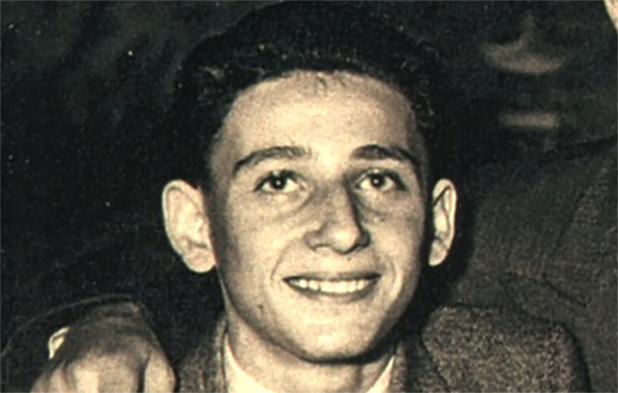
Bernard Offen
1929

Czarno-białe zdjęcie portretowe młodego mężczyzny. Ujęcie en face, od pasa w górę. Mężczyzna maj krótkie, zaczesane do tyłu włosy, owalną twarz, mocno zarysowaną szczękę, wąskie usta, duże oczy i odstające uszy. Uśmiecha się odsłaniając zęby. Patrzą prosto w obiektyw. Ubrany jest w ciemny garnitur, białą koszule i krawat w dekoracyjne wzory.
Bernard Offen, son of Guta (Rochme Gitel Zwirn-Schiffer, 9 March 1897, Krakow – October 1942, Bełżec) and Jakub (12 March 1894, Dąbrowa Tarnowska – August 1944, Auschwitz), survived the Krakow ghetto and German nazi camps: Julag I, KL Plaszow, KL Mauthausen, KL Auschwitz, KL Dachau-Kaufering.
Bernard Offen came from a religious, unwealthy Jewish family. His father Jakub Offen was a shoemaker by profession. However, until the outbreak of the war he made a living by trading in pool tables and tobacco. Bernard’s mum (who ran the house and raised four children) could make tailor patterns and sew.
Bernard had two elder brothers: Salomon (1921, Krakow – 2013, Michigan) and Natan (1922, Krakow– 2017, Florida) as well as sister Miriam (1928, Krakow – October 1942, Bełżec).
The Offens lived in a one-room flat on the ground floor of an annex to the house in 9 Krakusa Street. They prayed at the synagogue in 13 Limanowskiego Street, which belonged to the Bikur Cholim society, whose aim was to support poor and ill Jews living in the Podgórze district. The parents spoke Polish and Yiddish.
As his family was religious, since the age of three or four Bernard attended the Talmud Tora school in 30 Rękawka Street, which was financed by the Jewish community. It was a branch of the school located in Estery Street in the Kazimierz district intended for religious and unwealthy Jews.
After the outbreak of WW2, Bernard’s education in the Polish school ended in mid-December 1939, when Jewish students were expelled from schools. Jewish religious schools were closed down a few months later – in May 1940.
During the occupation period Jakub not only returned to his shoemaking profession, but also began to train his youngest son in it because he decided that some practical skill would be useful to him during wartime.
The Offens obtained a permission from the German occupying authorities to remain in Krakow. When the Germans established a ghetto for Jews in Podgórze in March 1941, the Offen’s flat was on its premises. Initially, Bernard's mother and sister worked at DEF and later at Julius Madritsch’s clothing factory. They sewed and repaired military uniforms as well as working clothes. The father worked at a shoemaking factory at Zentrale für Handwerklieferungen located in the former chocolate factory Optima. The twelve-year-old Bernard not only helped his father repair shoes but also traded on the Aryan side and smuggled food into the ghetto.
The Offens escaped transportation to the extermination camp in Bełżec in early June 1942, when about 7,000 people were sent there in sealed freight wagons and subsequently murdered.
By the decree of Rudolf Pavlu, the city prefect, of 20 June 1942 the area of the ghetto was reduced to exclude the region between Krzemionki and Tarnowska Street (today Limanowskiego Street). The Offen’s flat was now outside its borders. To comply with the order to relocate onto the premises of the reduced ghetto by 25 June 1942, the family moved into the flat of Bernard's youngest aunt, Itka Zwirn-Schiffer, who still before the war married the furrier Leon Rosen and lived in 5. Limanowskiego Street.
A few months later, during the October 1942 displacement action Bernard’s mum Gusta and his sister Maria were taken away and murdered in the Bełżec extermination camp. Bernard himself was outside the ghetto at the time.
After the liquidation of the ghetto on 13 March 1943 Bernard, his father and brothers were relocated to the Plaszow German nazi slave-labour camp. Bernard managed to escape from the camp while being transported with other children by three farm carts. For a few days he was hiding in the nearby Christian cemetery. He spent one night at Władysław Cieślik’s, his elder brother’s friend, in 14 Kalwaryjska Street. However, he did not want to put his wife and three children at risk. He was given food and returned to his hideout in the cemetery.
He made contact with a group of prisoners of the Julag camp working near the cemetery. The men were pulling down some dilapidated buildings in Wielicka Street. Among the prisoners was Bernard’s uncle Majer Gotreich – husband of his mother’s sister Bajla. Having no alternative, with the help of the prisoners returning to the camp Bernard made his way to Julag. There he went down with typhus. After two weeks of hiding in a barrack, with the help of uncle Majer, who got hold of drugs for him the boy impersonated a deceased prisoner and got a job feeding pigs.
The Julag camp was liquidated and on 10 November 1943 Bernard Offen along with other prisoners got into the Plaszow German nazi labour camp. He met his father there. The two worked at a shoemaking workshop (barrack no 82), where they made shoes for the Germans. For some time, Bernard took part in sabotage. The shoes he made had a latent defect: soles broke upon being hit.
Due to the approaching Red Army since mid-1944 the Germans liquidated the camps. Prisoners were sent in evacuation transports to other camps located further away from the front, deep into the Reich.
On 10 August 1944 Bernard, his father and brothers found themselves in one of such transports to KL Mauthausen (Austria). Samuel and Natan were sent to a sub-camp in Gusen (they worked at quarries). On 22 August 1944 Bernard and his father were sent to KL Auschwitz. Jakub died in a gas chamber there. Bernard, who escaped death, had the number “B7815” tattooed.
On 27 October 1944, having spent over two months at KL Auschwitz and having undergone a selection conducted by Dr Josef Mengele, Bernard was transported by truck to Landsberg-Kaufering, a sub-camp of KL Dachau located ca. 20 km away from Munich. He worked at a smithy and a quarry: by narrow-gauge railway he transported stone used to build aircraft hangars.
In late April 1945 the SS began evacuating KL Dachau in order to make it impossible for the Allies to liberate the camp. Around 25,000 prisoners were sent south from the main camp and a network of sub-camps. Some of the prisoners were transported by freight trains, while others in early May were forced to undertake a strenuous march – the death march. Among the latter was the sixteen-year-old Bernard Offen. On 2 May 1945, after a week-long march 43 km away from the camp he came across American soldiers near Wolfratshausen.
Bernard set off in search of his brothers. He travelled by various means of transport including coal trains, trucks and on foot. Six weeks later he found them near Bari in a camp set up by general Anders, which received Poles arriving from Germany.
The hardest part was to tell his brothers about their father’s death. From a family of over 50 people, they were the only ones that survived – the three brothers: Bernard, Natan and Salomon.
Bernard did not return to Krakow. After a one-year stay in Italy together with his brothers (who had to repatriate themselves along with the soldiers of the 2nd Polish Corps) he left for Great Britain. The brothers lived in London for one year. Bernard would often miss his classes and spend time at the cinema, which allowed him to forget about the horrors of war. He would watch comedies and western movies and dream about going to the USA. His dream came true in 1951. The survivors joined their family who have emigrated to America after WW1. Bernard Offen started a new life in Michigan and a year later joined the US army to fight the war in Korea.
Having returned, he opened a self-service laundry and in 1957 started a family. He had two sons: Michael and Jay. In the 1970s he protested against the development of nuclear power in the USA.
He did not manage to forget or escape his wartime past. In 1981 he visited Poland for the first time. He soon discovered that he was three years older than he had thought. During the war he would keep his birth date secret, as his father taught him to do, and consequently forgot when he was born.
For over 40 years, Bernard has been regularly coming to Krakow from the USA and guiding those who are interested around the area of the former ghetto and the Plaszow camp. He gives interviews and lectures. He made documentary films: A Cracow Getto Survivors Holocaust Trilogy: The Work (1983), My Hometown Concentration Camp (1997), Process B-7815. My Auschwitz Tatoo (1999), Hawaii and the Holocaust (2003) and Return to Auschwitz (2007), which tell the story of his wartime experiences.
In 2008 he published the book My Hometown Concentration Camp. A Survivor’s Account of Life in the Kraków Ghetto and Plaszow Concentration Camp, which was relaunched a few times. He educates and spreads the truth about the Holocaust because he believes it to be his duty but also because it is a kind of therapy to him.
Gallery
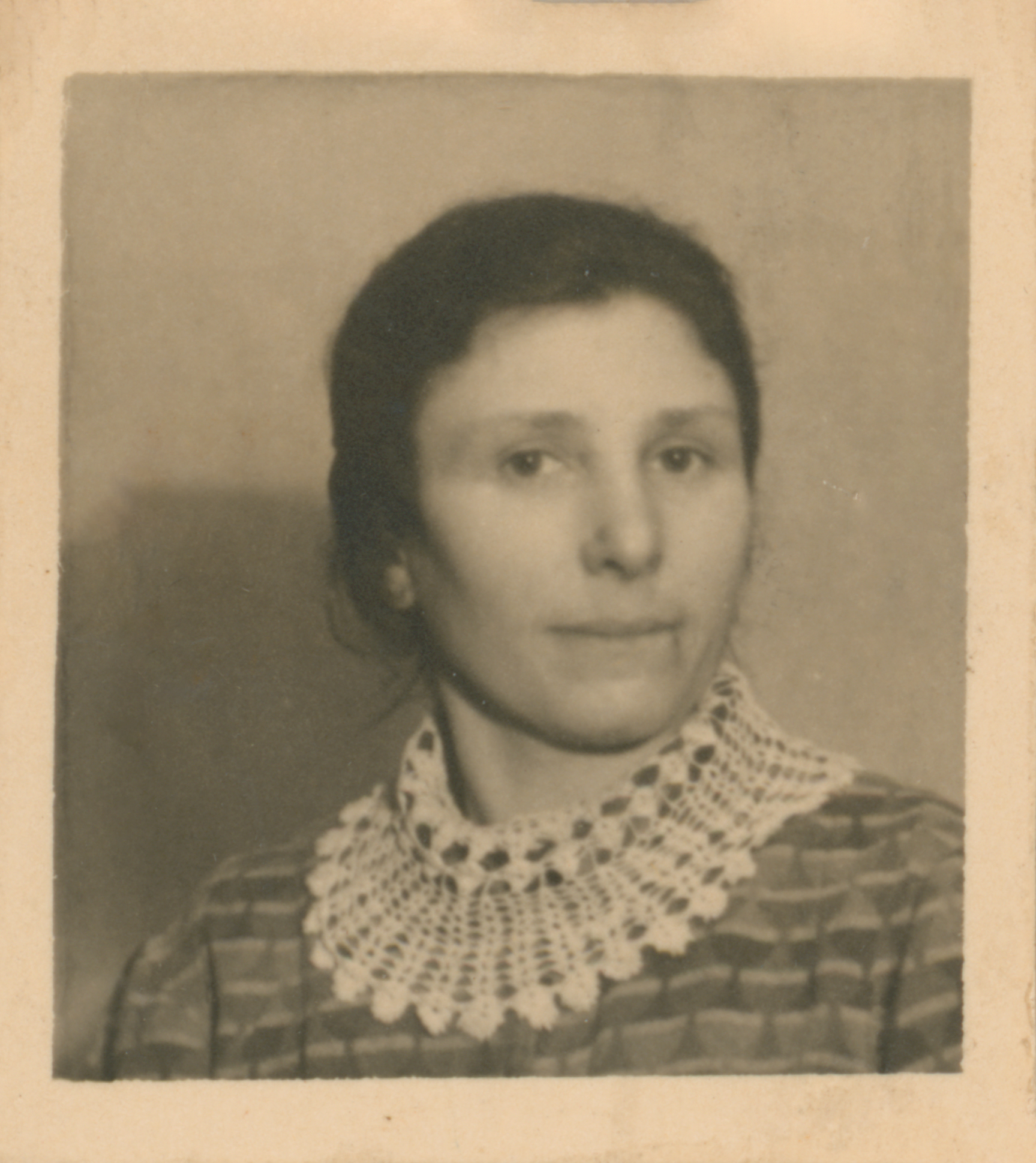
Gusta Offen, Bernard’s mother, Krakow, ca. 1940, property of the National Archives in Krakow

A black and white headshot of an approx. forty-three-year-old woman. A ¾ view close-up shot. The woman has got dark, combed back hair. She is wearing a blouse or a dress with a white, round, crocheted collar. She is looking into the lens.
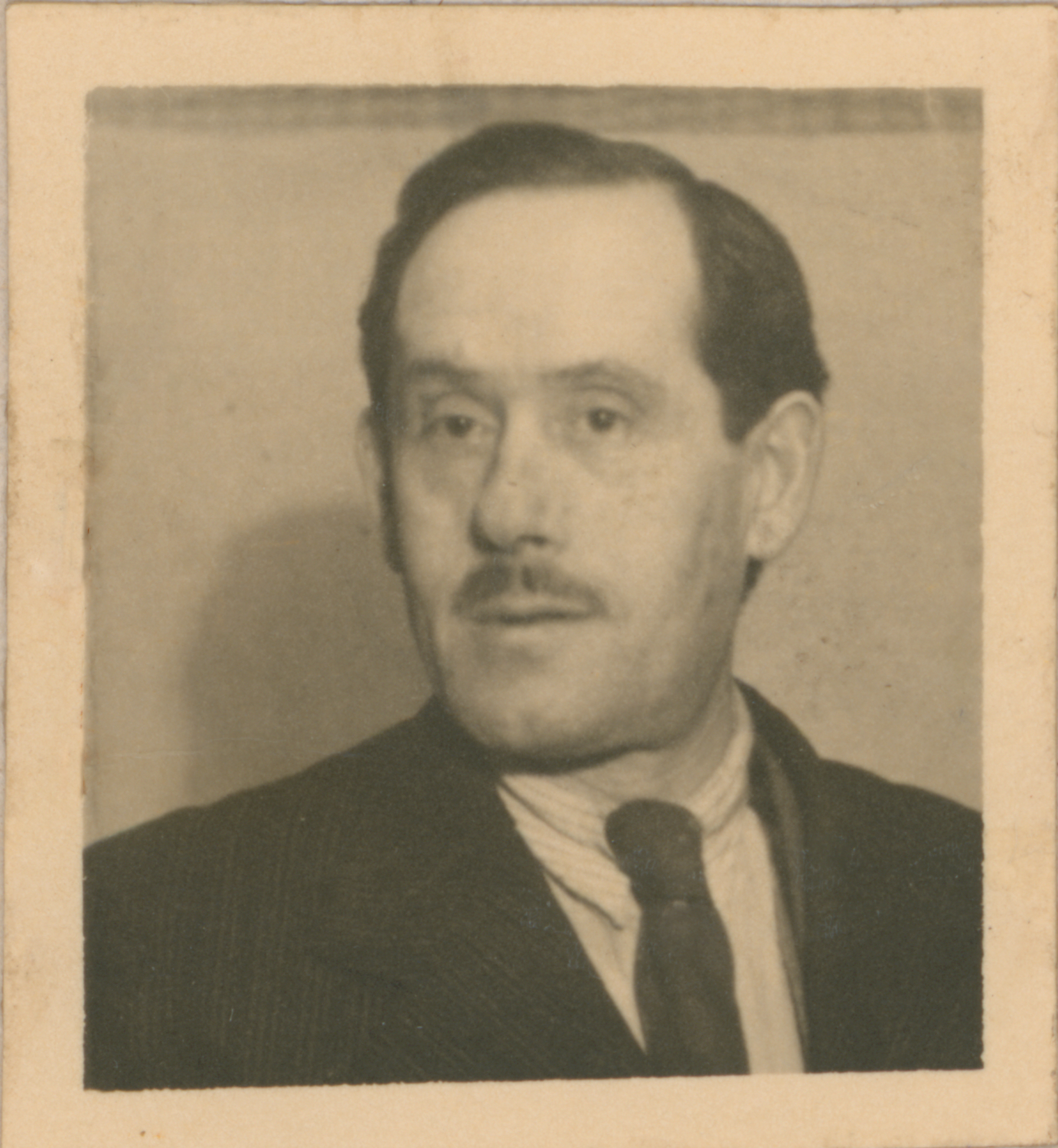
Jakub Offen, Bernard’s father, Krakow, ca. 1940, property of the National Archives in Krakow

A black and white headshot of an approx. forty-seven-year-old man. A ¾ view close-up shot. The man has got dark, short, slightly wavy hair with a parting over his left uncovered ear, a high forehead, thin lips and a small moustache. He is wearing a black jacket, a white shirt and a tie. He is looking left, off camera.
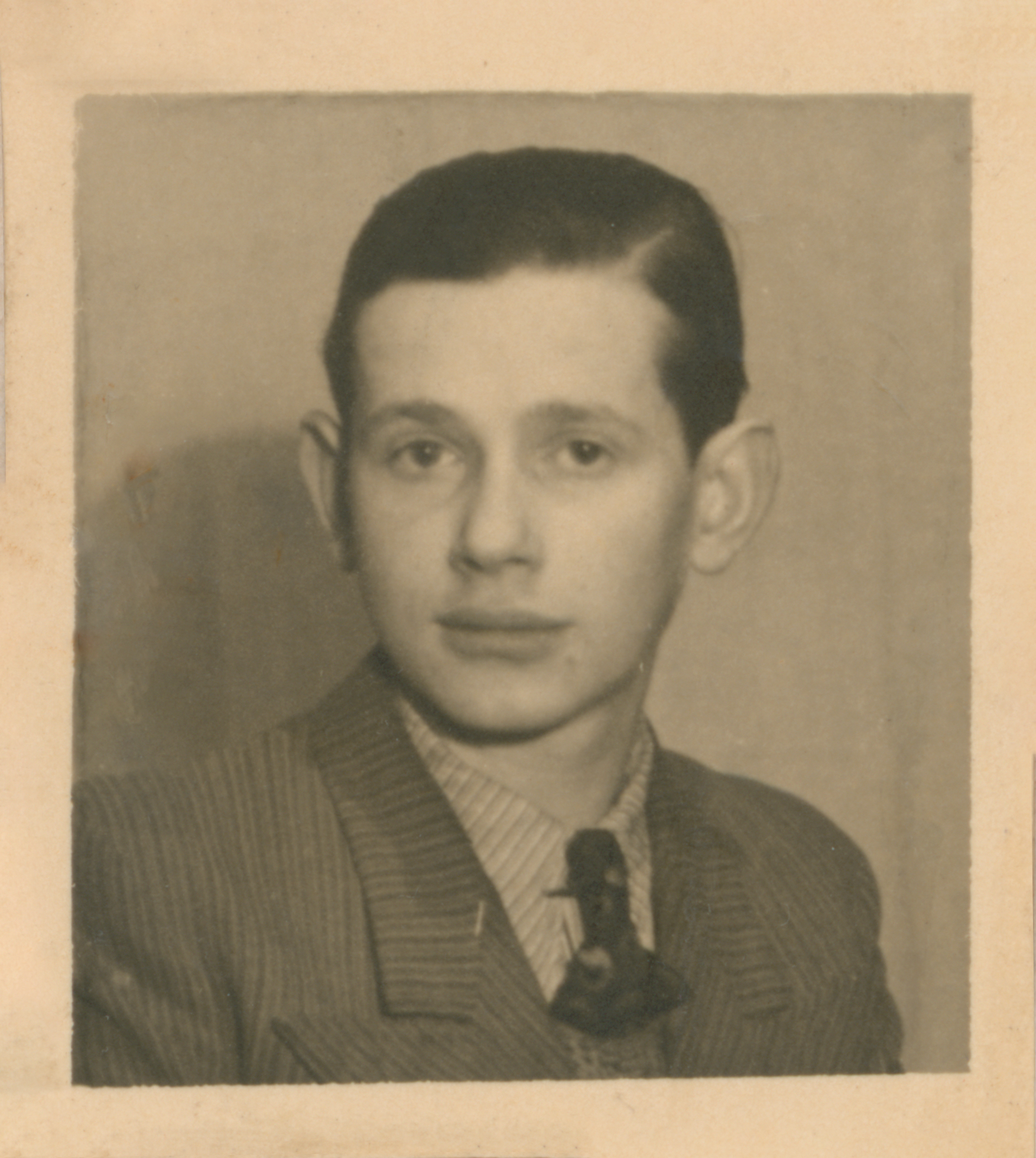
Salomon Offen, Bernard’s brother, Krakow, ca. 1940, Property of the National Archives in Krakow

A black and white headshot of an eighteen-year-old man. A ¾ view close-up shot. The young man has got dark, smooth hair with a parting over his right ear, a long face, a wide mouth and protruding ears. He is wearing a pinstriped jacket, a striped shirt and a tie. He is looking into the lens.
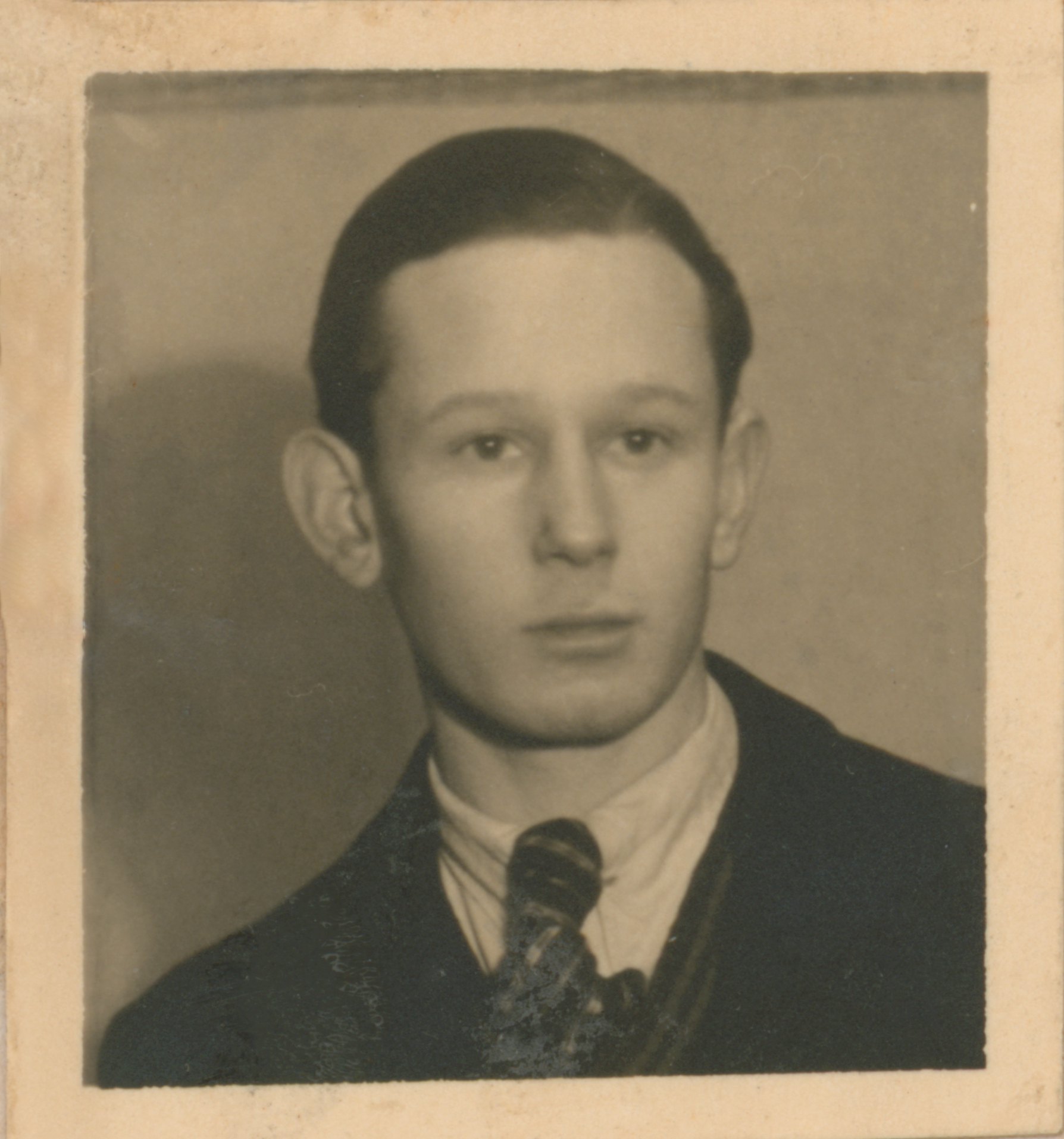
Natan Offen, Bernard’s brother, Krakow, ca. 1940, Property of the National Archives in Krakow

A black and white headshot of a seventeen-year-old man. A ¾ view close-up shot. The young man has got dark, smooth, combed back hair, a long face with a strong jawline, a high forehead, thin lips, protruding ears. He is wearing a dark jacket, a white shirt and a tie. He is looking into the lens.
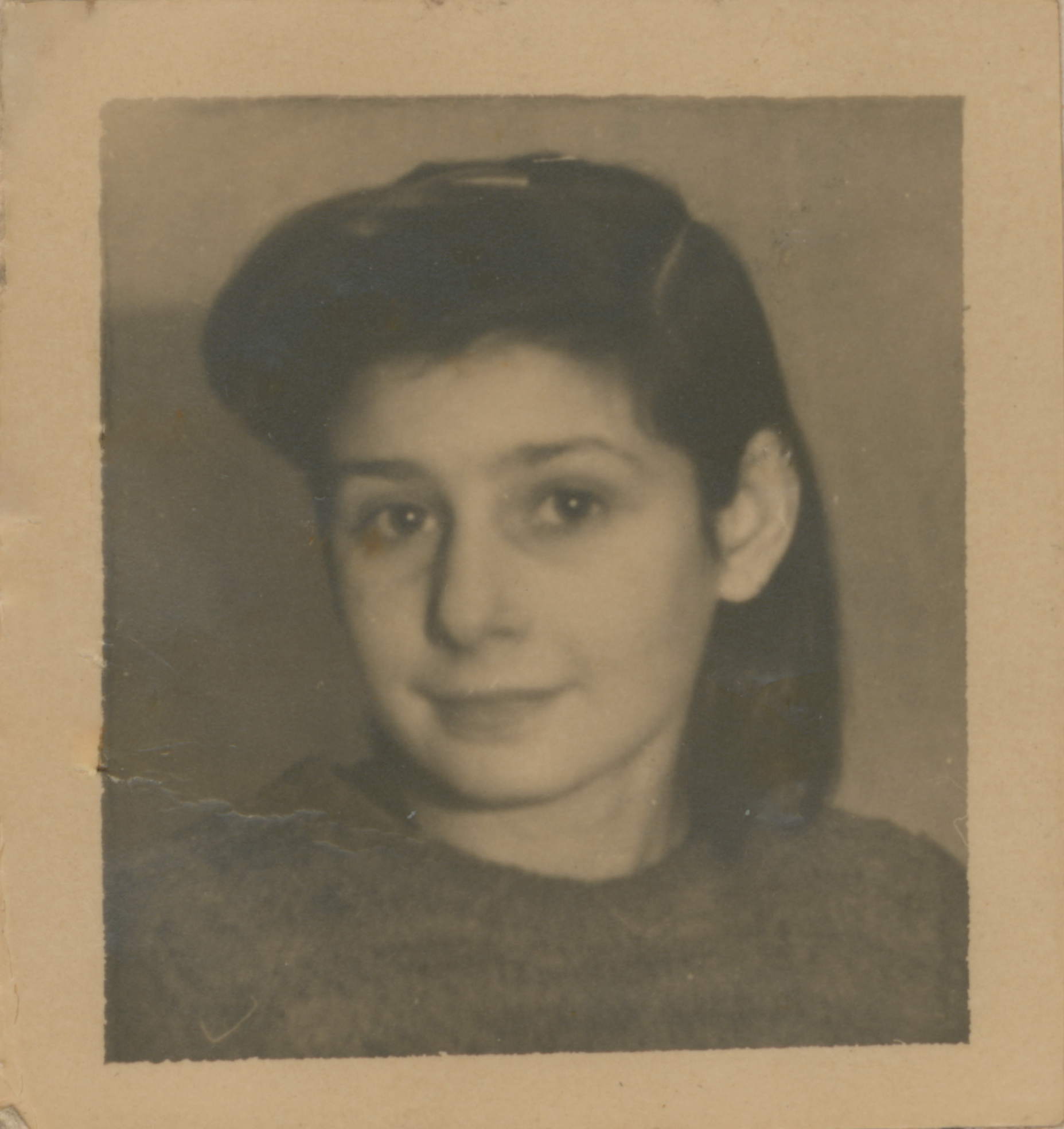
Mariem Offen, Bernard’s sister, Krakow, ca. 1940, Property of the National Archives in Krakow

A black and white headshot of an approx. fourteen-year-old girl. A ¾ view closeup shot. The girl has got dark, thick, shoulder-length hair with a parting over her left uncovered ear, big, dark, shining eyes, thin lips. She is wearing a dark crewneck jumper. She is looking into the lens and smiling slightly.
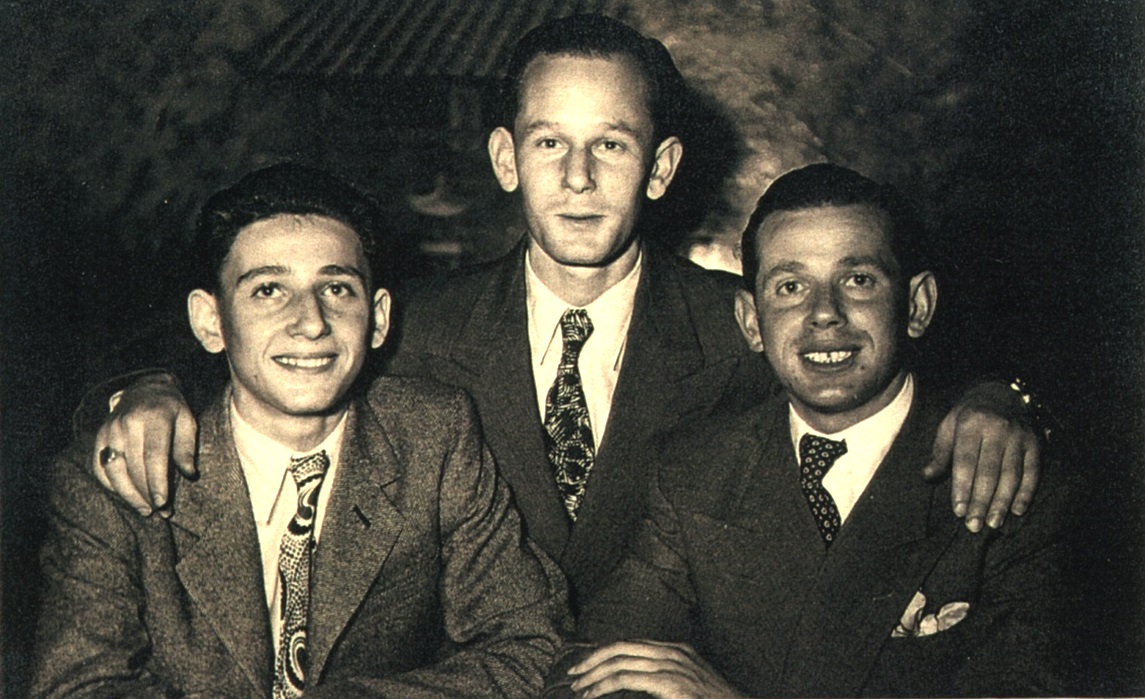
Bernard Offen with his brothers: (from left) Natan and Samuel, London, 1950, private property

A black and white photographic portrait of three young men against dark background. A full face medium close-up. The men are wearing dark suits, white shirts and patterned ties. The man on the right has got a bright handkerchief in his buttonhole. The ones on the left and right are grinning. They are sitting with their elbows on the table. Only the right hand of the man on the right is visible, resting on his left forearm. The man standing in the middle is embracing the remaining two; his hands are resting on their shoulders. He is wearing a signet ring on a finger of his right hand. On his left hand something, perhaps a watch, is shining. All the men have got short, combed back hair, strong jawlines and protruding ears. They are looking straight into the lens.
